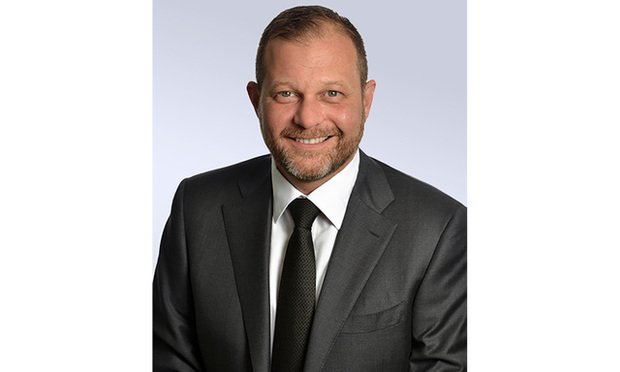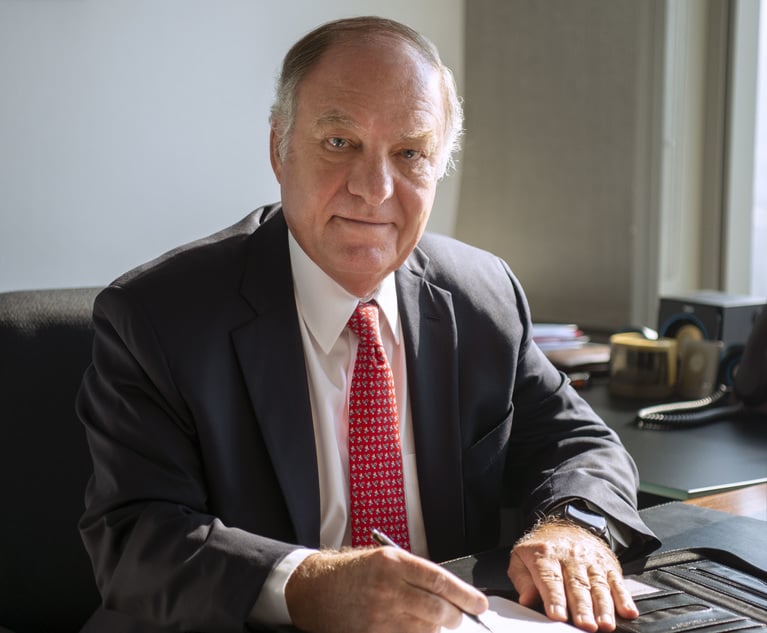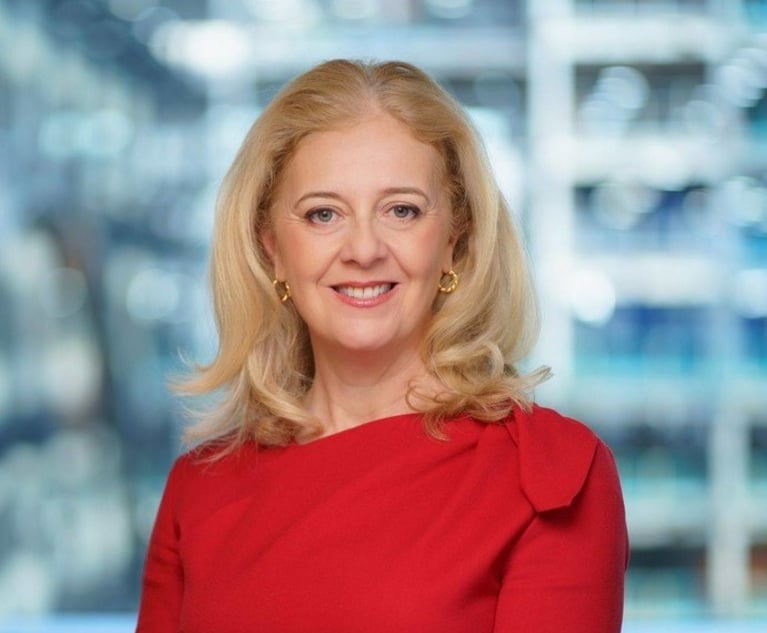Litigation Funder IMF Bentham CEO Says Planned Merger Is Hedge Against Regulation
In an interview with Law.com, Andrew Saker said the merger will help the Australia-based firm pursue its diversification strategy, which aims to reduce risk by seeking more cases and a wider range of case types and increasing funding sources primarily through geographic diversity.
October 21, 2019 at 03:25 PM
5 minute read
 Andrew Saker, CEO and managing director of litigation funder IMF Bentham/courtesy photo
Andrew Saker, CEO and managing director of litigation funder IMF Bentham/courtesy photo
Australian litigation funder IMF Bentham is merging with Dutch funder Omni Bridgeway as a hedge against competition and increasing regulation, IMF Bentham chief executive Andrew Saker said in an interview with Law.com.
The merger will create a global funder with more than $1.5 billion in capital to fund disputes and will provide Bentham with a base to expand into continental Europe, he said.
The merger continues Bentham's diversification strategy, which aims to reduce risk by seeking more cases and a wider range of case types and increasing funding sources, primarily through diversity of geography.
In particular, Saker said the merger aims to help counter the two key risks of market competition and regulatory intervention.
"You don't want to put all your eggs in the U.S. and [then] they outlaw litigation funding, or in Australia and then they open it up to contingency fees and it undermines your whole business model," he said by way of example.
In the five years since Saker, a former partner with a local accounting firm, became CEO, Bentham has expanded in the U.S. from two offices to four and opened offices in Canada, Singapore, Hong Kong and the U.K.
But because Europe is an unfamiliar civil law jurisdiction instead of the common-law jurisdictions the firm is used to, it decided to expand there via a merger.
While the deal has been portrayed in some sections of the Australia media as a takeover, and is structured such that Bentham will acquire Omni Bridgeway, Saker insists it is a genuine merger and the firms have complementary businesses, with Bentham focusing on prejudgment merit-based litigation funding, whereas Omni Bridgeway mostly funds postjudgment enforcement.
Postjudgment enforcement is an area that is unfamiliar in mature legal systems such as the U.S., the U.K. and Australia, where victorious plaintiffs can expect settlements or have the courts enforce settlements.
But in other jurisdictions, some parties thumb their noses at judgments and there is less assistance from the legal system. Omni Bridgeway's business is built primarily on this problem and offers funding for parties to pursue settlements. It operates in Europe as well as in the seven 'Stan' states of central Asia, the former Soviet Union, the Middle East and north Africa.
"We see it as an opportunity to expand our offering," Saker said of postjudgment enforcement. "We could go to a client who's got a mixture or a portfolio of both merits-based and enforcement-type claims, which would not have otherwise been appealing to us because we didn't have that skill base, nor appealing to Omni Bridgeway because they didn't have the skill base on the merits side."
While Omni Bridgeway does some prejudgment litigation funding, Saker sees the merger as an opportunity to expand Bentham's core offering in Europe, where he said there is a much smaller penetration of prejudgment litigation funding than in other markets. In part that is because the adverse cost risk was much lower, but Saker said the risk is increasing as litigation costs in Europe rise.
Omni Bridgeway was founded in the Netherlands in 1986 and is a financier of high-value claims and a global specialist in cross-border enforcement against sovereign governments.
Bentham was founded in Australia in 2001. Most of its investments go toward commercial litigation, cartel cases, patent claims, commercial arbitration in Hong Kong and Singapore, and whistleblower cases in the U.S.
However, in its home base of Australia, it is best known as a funder of consumer and shareholder class actions, despite this making up a small and decreasing proportion of its total book of business. Saker said this reputation is holding back its expansion because corporations aren't widely aware of litigation financing beyond class actions.
"They're aware of litigation funding as those pesky ambulance chasers that initiate class actions. They're not aware that litigation funding actually could be used as a tool to mitigate costs, risks and people management," he said.
Part of Bentham's diversification strategy has involved shifting from making investments on its own balance sheet, using the company's own funds, to more of a fund manager approach. It still invests its own funds, but into specially created funds that also include outside investors. Thus, a $50 million investment by Bentham might be met with $200 million from other investors, allowing it to fund a wider range of cases and reduce the risk that one or two losses would severely hit that year's profits.
Until 2015, it funded about six cases a year worth $30 million. This year, said Saker, it will invest in about 50 cases with about $189 million in funding. "If one or two of those go wrong, no one blinks an eyelid because it doesn't hurt," he said.
In June, Bentham launched its Fund 5, seeking $500 million from investors, with an option to upsize to $1 billion.
The transition from on-balance sheet investment to funds-based investment is nearly complete, but it has dragged Bentham into a loss during the past two fiscal years. This year, it had a pre-tax loss of $32.7 million.
"You need to invest ahead of the curve to set up the infrastructure to be able to make the diversification. So, it was a lot of pain to go through to get us to a point where we could progress in the direction we wanted to go," said Saker, who pointed out that the share price has risen strongly.
"It's a bit of an irony that you would get losses over the last couple of years, but your share price basically doubles. I think people understand the process we're going through," he said.
This content has been archived. It is available through our partners, LexisNexis® and Bloomberg Law.
To view this content, please continue to their sites.
Not a Lexis Subscriber?
Subscribe Now
Not a Bloomberg Law Subscriber?
Subscribe Now
NOT FOR REPRINT
© 2025 ALM Global, LLC, All Rights Reserved. Request academic re-use from www.copyright.com. All other uses, submit a request to [email protected]. For more information visit Asset & Logo Licensing.
You Might Like
View All
Carey Abogados’ Senior Partner Becomes New Head of IBA, First Chilean to Assume Role of President

Goodwin Hires Quinn Emanuel Antitrust Partner to Launch Brussels Office
3 minute read
Claus von Wobeser: Mexico's ‘Godfather of Arbitration’ Becomes Firm’s Honorary Chair

Jenner & Block Expands London Team with Baker McKenzie Hire to Lead New Practice Area
2 minute readTrending Stories
Who Got The Work
J. Brugh Lower of Gibbons has entered an appearance for industrial equipment supplier Devco Corporation in a pending trademark infringement lawsuit. The suit, accusing the defendant of selling knock-off Graco products, was filed Dec. 18 in New Jersey District Court by Rivkin Radler on behalf of Graco Inc. and Graco Minnesota. The case, assigned to U.S. District Judge Zahid N. Quraishi, is 3:24-cv-11294, Graco Inc. et al v. Devco Corporation.
Who Got The Work
Rebecca Maller-Stein and Kent A. Yalowitz of Arnold & Porter Kaye Scholer have entered their appearances for Hanaco Venture Capital and its executives, Lior Prosor and David Frankel, in a pending securities lawsuit. The action, filed on Dec. 24 in New York Southern District Court by Zell, Aron & Co. on behalf of Goldeneye Advisors, accuses the defendants of negligently and fraudulently managing the plaintiff's $1 million investment. The case, assigned to U.S. District Judge Vernon S. Broderick, is 1:24-cv-09918, Goldeneye Advisors, LLC v. Hanaco Venture Capital, Ltd. et al.
Who Got The Work
Attorneys from A&O Shearman has stepped in as defense counsel for Toronto-Dominion Bank and other defendants in a pending securities class action. The suit, filed Dec. 11 in New York Southern District Court by Bleichmar Fonti & Auld, accuses the defendants of concealing the bank's 'pervasive' deficiencies in regards to its compliance with the Bank Secrecy Act and the quality of its anti-money laundering controls. The case, assigned to U.S. District Judge Arun Subramanian, is 1:24-cv-09445, Gonzalez v. The Toronto-Dominion Bank et al.
Who Got The Work
Crown Castle International, a Pennsylvania company providing shared communications infrastructure, has turned to Luke D. Wolf of Gordon Rees Scully Mansukhani to fend off a pending breach-of-contract lawsuit. The court action, filed Nov. 25 in Michigan Eastern District Court by Hooper Hathaway PC on behalf of The Town Residences LLC, accuses Crown Castle of failing to transfer approximately $30,000 in utility payments from T-Mobile in breach of a roof-top lease and assignment agreement. The case, assigned to U.S. District Judge Susan K. Declercq, is 2:24-cv-13131, The Town Residences LLC v. T-Mobile US, Inc. et al.
Who Got The Work
Wilfred P. Coronato and Daniel M. Schwartz of McCarter & English have stepped in as defense counsel to Electrolux Home Products Inc. in a pending product liability lawsuit. The court action, filed Nov. 26 in New York Eastern District Court by Poulos Lopiccolo PC and Nagel Rice LLP on behalf of David Stern, alleges that the defendant's refrigerators’ drawers and shelving repeatedly break and fall apart within months after purchase. The case, assigned to U.S. District Judge Joan M. Azrack, is 2:24-cv-08204, Stern v. Electrolux Home Products, Inc.
Featured Firms
Law Offices of Gary Martin Hays & Associates, P.C.
(470) 294-1674
Law Offices of Mark E. Salomone
(857) 444-6468
Smith & Hassler
(713) 739-1250








